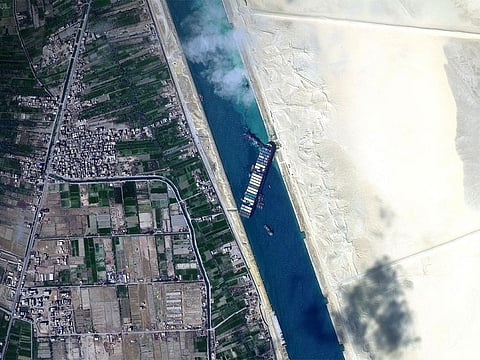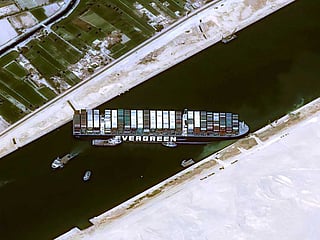Reflections of the Suez Canal incident
It is a reminder for Biden administration that it can’t disengage from the region

Joe Biden doesn’t think the Middle East should be a priority of his administration. He seems to think that too many presidents had spent too much time on the region for too long. Unlike his predecessors, he probably thinks that is unnecessary. Then came the Suez Canal incident — a giant container ship blocked the vital waterway for a week. This incident, most probably, will not change the US president’s mind, but it should.
“If you are going to list the regions Biden sees as a priority, the Middle East is not in the top three,” a close Biden adviser told the Washington-based Politico newspaper on February 22. “It’s Asia-Pacific, then Europe, and then the Western Hemisphere.”
Another Biden adviser said of the new administration: “They are just being extremely purposeful to not get dragged into the Middle East.”
The US President is said to be “tired” of the Middle East problems, the newspaper reported. That is of course another way of saying that he has no specific plan or a policy to deal with arguably the most important region in today’s world. A huge mistake. This is why.
On the morning of March 23, Japanese container ship, Ever Given, a 400-metre-long, 220,000-ton vessel, was knocked by strong winds, and ended up jamming itself across the Suez Canal with its bow and stern stuck in the canal bank. That of course blocked the canal traffic for six days.
By March 28, at least 369 ships were stuck at the entrance of the canal waiting to pass, halting billions of dollars’ worth of trade. On March 29, the Egyptian authorities finally managed to free the ship and allow shipping to resume in what was described as one of the largest and most intense salvage operations in modern history.
Significance of Suez Canal
The disruption was significant as, according to most estimates, over 10 per cent of global trade passes through the canal, including nearly 10 per cent of world oil. More than 50 ships pass through the canal daily. More importantly, when the Suez Canal was opened in 1869, it lowered the cost of moving goods between Asia and Europe, which for centuries used the traditional longer route via the Cape of Good Hope, the southern tip of Africa.
The Suez Canal has cut that distance by half. Today, a single ship would save at least $26,000 (Dh95,420) a day in fuel cost and weeks in travel time. One can easily calculate how much the world has saved in cost, time and resources in the 150 years since the opening of the Suez Canal.
It is not an exaggeration to say that the canal, with its strategic location has had a significant contribution to multilateral world by facilitating and speeding global trade. The world, they say, has become one small village by the advance of technology.
Sure. But a great deal of that technology has passed through the Suez Canal. In addition to the impact on world trade, the Ever Given incident is intellectually, and politically, significant too as it highlights to those who may be ‘tired’ of the Middle East that this region has always been and will remain important strategically no matter who occupies the high office in the White House.
For thousands of years, the region has been the centre of attention and source of conflicts due to that unique importance. It is not only the cradle of civilisation and the birthplace of heavenly religions, but also contemporarily vital with its vast energy resources and the complexity of its issues and their impact of today’s world.
A little bit of historical reminder is probably due here.
Cradle of civilisation
The Middle East has been named the cradle of civilisation since the rise of communities in the ancient Fertile Crescent almost 16,000 years ago. The Fertile Crescent refers to areas along the Tigris, Euphrates, and Nile rivers — a vast area that now includes Iraq, Syria, Jordan, Palestine, Lebanon and Egypt. Some historians add Kuwait too.
The abundance of water made that region fertile for the birth and development of defined communities that are credited with the establishment of viable civilisations that introduced to the world the written language, farming and irrigation techniques, domestication of animals, art of war, architecture and the first set of laws, the Hammurabi Code, in ancient Babylon (today’s Iraq), which was the heart of Mesopotamia.
Modern historians say humans first settled in Mesopotamia well before 14,000 BC. Meanwhile, the civilisation of Ancient Egypt, which began some 7,000 years ago, is known for its achievements in art and architecture, engineering, medicine and statecraft. Its great structures on the banks of the Nile, including the Pyramids, are timeless wonders and eternal testament to the contribution of this region’s people to humanity.
Judaism was born here 5,000 years ago. So was Christianity 22 centuries ago and Islam 15 centuries ago. At one point the Arabs ruled a vast area, from China in the east to Andalusia (today’s Spain and Portugal) in the west. Later on, the Ottomans saw the region as a prerequisite for their expansion.
For more than 4 centuries, they tried to annex and assimilate the region but eventually failed when the Arabs revolted in 1916 to create their own independent states. Then came the colonists, the British and the French motivated by their own imperial vision of the region — what the late Edward Said called ‘the orientalist discourse’.
That discourse, Said wrote in his masterpiece ‘Orientalism’, attempted to divide the world between the ‘Orient’ and the ‘Occident’, to allow the West to “present themselves as being superior to those in the Middle East, providing them with a rationale to control and have a strong voice in the region and its affairs.”
The Balfour Declaration of 1917, which called for a ‘national home for Jewish people’ in Palestine was an example of that policy, Said wrote. The region’s chaotic affairs for the past 70 years, many argue, are the direct result of that declaration.
Today’s Middle East, maybe weaker and fractured, nevertheless remains crucial to world’s welfare, peace and most importantly future. According to most estimates, 65 per cent of Opec’s oil reserves are located in the Middle East. The region supplies over 30 per cent the world’s crude and holds 40 per cent of the world’s conventional gas reserves.
The 1973 oil crisis highlighted the role that precious commodity can play in world politics. In October that year, Egypt and Syria went to war against Israel. The Arab oil-producing states, in the Gulf, decided to stop the sale of oil to western countries that supported the Israelis with weapons during the war.
As the production halted, the price of oil spiked dramatically — it went from $3 a barrel to $12, and by 1979 it was nearly $40. The two biggest economies at that time, the US and Japan, nearly collapsed. That led the US to take another look at the Middle East, a more serious and constructive look, henceforth, starting the American engagement in an attempt to solve the long-standing Palestinian question. The US also began working hand in hand with regional states to ensure peace and stability in the Middle East.
President Biden cannot just overlook all of that because he is ‘tired’ of the Middle East problems. Former President Barack Obama tried to disengage from the region and failed — he put all his eggs in the Iranian basket and failed miserably. President Biden needs to remember that.
The Suez Canal incident is perhaps another reminder why the region is too important to ignore.









